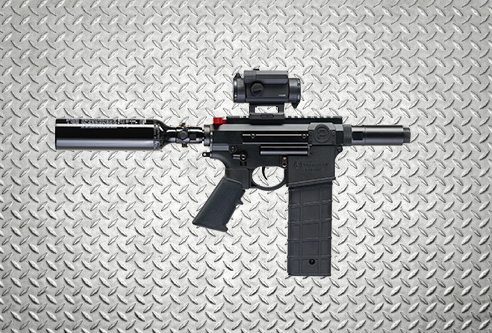When the White House proclaimed May 2025 National Mental Health Awareness Month, it highlighted first responders as a priority population—confirming what every officer already knows: a healthy mind is mission‑critical. This year’s focus on policing shines a welcome light on resources designed with the badge in mind.
According to Blue H.E.L.P., first responders are more at risk from mental health incidents than in line‑of‑duty occurrences.
Yet agencies that embed peer‑support teams, confidential counseling, and regular wellness check‑ins are reporting measurable gains in morale and retention. The International Association of Chiefs of Police now lists mental fitness—and the leadership that champions it—alongside body armor and driver safety in its Officer Safety and Wellness framework.
PepperBall embraces that holistic outlook. Its scenario‑based instructor courses build confidence with non‑lethal launchers that let officers resolve threats at safe stand‑off distances, lowering both physical risk and the psychological weight of deadly‑force decisions.
This May, leaders can take three concrete, upbeat steps:
- Put wellness on the training calendar. SAMHSA’s 2025 Mental Health Awareness Month Toolkit offers roll‑call talking points and social‑media assets that command staff can fold into daily briefings. samhsa.gov
- Celebrate peer‑support successes. Whether it’s a veteran officer who completed a mental‑fitness course or a rookie who volunteered for a suicide‑prevention walk, sharing positive stories normalizes help‑seeking behavior and chips away at stigma.
- Equip the field for de‑escalation. Non‑lethal options like the PepperBall system provide a tangible link between tactical readiness and mental resilience. Fewer lethal‑force deployments give officers greater day‑to‑day control over their careers. and peace of mind.
PepperBall encourages every department to share their Mental Health Month activities on internal channels and social media—because progress multiplies when officers see the profession moving forward together. By coupling robust wellness programs with tools that let officers resolve threats at safe stand‑off distances, agencies create an environment where courage and compassion coexist, and where every officer has a fair chance to go home mentally as well as physically.
Five Trusted Mental‑Health Resources for Public‑Safety Professionals
- Copline (1‑800‑267‑5463) – A 24/7 confidential hotline answered exclusively by vetted, retired law‑enforcement officers who understand the unique stresses of the job and can steer callers toward peer support or clinical care.
- Safe Call Now (1‑206‑459‑3020 or 1‑877‑230‑6060) – A nationwide crisis‑referral and assistance line for all public‑safety employees and their families, providing immediate access to mental‑health, addiction, and trauma resources vetted for first responders.
- Blue H.E.L.P. (bluehelp.org) – A nonprofit dedicated to acknowledging challenges, reducing stigma, and connecting current and retired personnel with culturally competent clinicians, peer groups, and family‑support programs.
- ResponderStrong (responderstrong.org) – A responder‑led initiative offering free digital toolkits, resiliency training, and a curated directory of therapists who specialize in police, fire, EMS, and dispatch stress injuries.
- 988 Suicide & Crisis Lifeline – Dial 988 from anywhere in the U.S. for round‑the‑clock, confidential counseling; with specialized support for first responders. Text and chat options are also available.





